#because her character was not written as a black woman role. she was not stereotypical. she was a fully realised person who happened to be
Explore tagged Tumblr posts
Text
before i go to bed bc i have been doing a lot of research- it’s *intensely* funny people whine about “gene's vision” whenever star trek is mildly transgressive like. i mean for one the dude stuffed the series with as much sex as he could in the time periods he was alive if he saw modern star trek and what’s possible on the air nowadays he'd probably say it needed to be way hornier lol. but also like. gene was progressive in his time outside of his fucking ridiculous level of misogyny. and even with that people who were Not Gene because turns out multiple people are involved in production of a whole tv show were often progressive in that area including women who obviously didn’t share the nightmare sexism gene had. and the series heavily reflected that, even if it’s not obvious today (since progressive for the 60s is usually intensely bigoted now). if the series wanted to be accurate to that it should actually be way more transgressive to the point it makes blunders bc the writers are tired from arguing with network executives. where’s the equivalent of the first interracial kiss on television guys ur playing it way too safe.
#like if the right wing boomers who liked star trek actually held the same opinions at the time they’d have called the show woke trash from#day fucking one. like. it's always been woke. including in the original sense that people distorted.#the creators were well aware of the networks bigotry and especially racism and actively fought against it#uhura behind as under-utilised as she might seem is the result of heavy compromises#and her actress was so demoralised until literally mlk told her how important and inspiring it was#because her character was not written as a black woman role. she was not stereotypical. she was a fully realised person who happened to be#a black woman. or at least she was as much as one as was possible from racist pushback.#which at the time was revolutionary! it wasn’t new but it was definitely important to so many people#they’d hate if they learned how many girls especially poc girls and especially especially black girls wanted to get into the sciences bc of#how inspired they were by uhura. star trek has always been progressive for its time. the fact it’s settled on the lighter end of that is#far further from genes vision than like#gay people existing
6 notes
·
View notes
Text
i want more nuance to be entered into the discussion of the green girl sorority and how differently cynthia plays elphaba in comparison to those who came before her because while a lot of people are rightfully like "why was elphaba not black from the beginning" and celebrating that she is now being played by a black woman, i think we need to be careful in just writing off all the elphabas of the past as Random White Girls when the role was championed (and often followed/succeeded) by a jewish woman
the pop culture archetype of the Wicked Witch has deep roots in antisemitism stretching faaaar far back. there is a level of reclamation happening in casting idina menzel, a jewish woman, to play the Misunderstood and Maligned young girl who is branded as exactly that. and stage!Elphaba is also written and acted with jewish stereotypes in mind--she is loud, aggressive, no-nonsense, blunt. she is quick to advocate for herself and shut down the discrimination she faces. all of this is very intentional! her personality is abrasive from years of abuse, and that makes propagandizing her easy. this is literally the thesis statement of the musical--it's not about aptitude, it's the way you're viewed.
cynthia's performance of elphaba is fucking INSPIRED despite going in a completely different direction. she's much more reserved, analytical, one of her key character traits is how well she can read people (see her calling out Galinda as insecure/putting on airs in their first scene together, clocking that Fiyero is using his party guy persona as a shield for his own depression) elphaba's attempts to blend in and make herself smaller all fail simply because of her existence, if not that then because she feels empathy so strongly she often struggles to hold back from acting, protecting.
personality wise, though, cynthia's elphaba is very quiet and closed-off, not at all the bullet-to-the-face that she is in the stage show, and... she still gets propagandized and maligned. though this seems to contradict the other interpretation, it tells of the other end of the spectrum of propaganda, one that black women watching (and many, MANY other marginalized folks) are sure to identify with--it does not matter how "nice," how reserved, how small a black woman makes herself. a racist society will still scrutinize her every action for a way to parse ill intent from it, brand her as an angry black woman who is dangerous and wicked, and write off any humanity she has in the process.
these two very different interpretations tell of the lie of assimilation. the fact of the matter is, when you are marginalized, there is no way to sand down your edges enough to make the people oppressing you "accept" you. that is why wicked is a tragedy at its core. whether loud and aggressive or quiet and unimposing, there is nothing elphaba could have done to make the people of Oz see her as anything other than a scapegoat to blame all their problems on.
so while i definitely appreciate that people are excited for black girl era elphaba, i would encourage us all to still show appreciation for what came before--that was not white girl era elphaba. that was jewish girl era elphaba. two houses, both alike in dignity, two stories both worth being told.
#wordy wendy#wicked#wicked movie#wicked 2024#wendy rambles#wendy meta#honestly i get chills whenever im watching the movie#and it gets to 'her green skin is a twisted manifestorial of her true nature#' what a wham line. literally makes me sick to hear.
17K notes
·
View notes
Note
A pet peeve of mine is how fandom will usually labeled a black girl as a lesbian which there’s nothing wrong with that however they tend to do this whenever the media show her and a guy lead having a romantic interest and says she’s a queen she need no man or she’s into girls so they can’t be together. It just sound coming from a place of malice cause they never explore her sexuality in their hcs or fanfic they just use it as an excuse to now ship her with the male lead saying there’s no way men will find her attraction. And it just using black lesbians as a scapegoat rather then exploration
The "She's an independent woman who don't need no man" is a double edged sword for black female characters because while it's meant to paint them as strong female characters, it is also an expectation for all black girls both fictional and real.
Not every black woman is super independent. There are plenty who need a helping hand or are more quiet or more shy but they get shoved under the "STRONG AND INDEPENDENT" label because that's what everyone and the media portrays them as. And this is SO rampant in fandom spaces sadly because a lot of series feed into this mentality.
And often when black female characters get this label slapped on them, they wind up in a more dominate role in a romantic relationship, and then people start writing them...weird. Some make them more masculine, some make them weirdly maternal - but they typically have to take on more responsibility than other female characters in the same series.
It's so damn rare for me to find fiction that features soft black girls...at least in fiction that isn't written by another black person (occasionally I will find other creators of color that manage to steer away from this independent trope).
ANYWAYS Fandoms will always fumble black girls because people don't bother to look into how something that might seem like a positive and harmless thing for one race may be a stereotype and expectation for another.
That and tons of people don't bother to look into other ways they can portray a female character as strong without using independence. IT IS POSSIBLE and VERY ENCOURAGED!
ESPECIALLY WHEN WRITING BLACK GIRLS
YOU DON'T ALWAYS GOTTA MAKE 'EM SASSY
273 notes
·
View notes
Text
Are we ever gonna talk about how ATSV has the most SUBPAR representation of POC girls.
The three young POC girls are all written extremely flatly or poorly.
Margo is all but ignored by the movies. All other teens get full intros. All of them, EXCEPT Margo. Ben Reilly, a joke character, gets more lines than her, despite her being more important to the plot.
Peni is often stereotyped and boiled down to the 'Japanese magical girl' trope - to the point it effects her art style.
Gayatri hardly gets any lines. Her scene and plot line is good but like Margo, she's written to be a footnote in her make counterparts story (Gayatri to Pavitr, and Margo to Miles)
Then the other two POC women are relegated to mother roles.
Like.... There are no fully-fleshed out black women in the entirety of the series. Am I tripping? Am I forgetting someone?
The only POC woman that is completely fleshed out is Rio and that's because she's Miles literal mom.
There isn't a single POC girl that gets reoccurring lines and doesn't tie directly to a boy character.
We've never seen a universe of a POC Spiderwoman. When it comes to Jess and Margo we know basically nothing about their backgrounds.
It bothers be so much. That's why it bothers me when people hate on FlowerByte. Like.. that's what youre mad about? Not the fact that an entire gender of POC people are erased/watered down in both movies??? Really????

#spiderman#atsv#spider man#marvel#across the spiderverse#miles morales#jessica drew#spiderwoman#spider woman#margo kess#peni parker#gayatri singh#rio morales
143 notes
·
View notes
Text
my thoughts on Saga Anderson and the lack of spotlight on her in fanworks
Hmmm…this has been bothering me since I waded into the fandom after AW2 dropped. WHY DOES 99.9% OF THE FANDOM SLEEP ON SAGA WHILE IT'S HALF HER GAME???
I DON'T understand the fixation on Casey (even though I adore him and he's the other half of my OTP), or Zane to the point that when Saga is in ensemble art, she's relegated to being the "bro". And for what purpose? She has just as much build up and storyline as Alan himself. She certainly has more screen time than FBI Casey. I see posts going "oh, I love Saga so much, she was so badass" and then almost nothing when it comes to fan work.
Do y'all understand, how, as a black woman, this frustrates me to NO end? I go to her tag on AO3, see new fics, get excited...just to see she's the bro or footnote to CaseyWake. I've literally been brought to TEARS over this. Saga was written with SO much love and care, and it's so obvious. She was not the stereotypical sassy, angry, loud black woman that we tend to get when we're even thought of at all.
And it's genuinely PAINFUL to see all of the love, all of that care, ALL OF THAT RESPECT, IGNORED by fandom because you want to focus on the white men. Because why? I get it, het is so icky for most of you, fine. But to not even give her fanart/fics just on her and her daughter? It's terribly egregious.
Saga Anderson is genuinely a role model. She's smart, warm, funny, dedicated, sympathetic and passionate. She will change REALITY just to save the ones she loves. She's NEVER had to deal with anything like the Bright Falls situation and she came through it with such GRACE. She saved the fucking day. She did what Alan couldn't do in THIRTEEN YEARS. And she gets no recognizance in fanworks?
And I know the majority of this fandom happens to be made up of women, at least for fanworks. You truly mean to tell me you can't, at all, even a little bit, relate to this woman? You can't make her the focus, instead of a background character? The white men are easier to understand and draw/write for?
I can't tell anyone who to like, or who to ship, nor would I ever try to, because on the internet, it seems like het is icky despite how amazing the woman is. But I've seen comments towards andercase fanart going "Saga, no, you're married!" But shipping CaseyWake in the same breath, despite Alan being married and getting back to his wife being the main motivation for Alan to do anything at all.
It comes off as hypocritical, it comes off a wee bit "I don't know what to do with this black woman...hmm, let's just make her root for CaseyWake" I'm left feeling that Sam and the team love Saga more than the fans ever do or will. And that fucking sucks. Because to put so much thought into a character and love the character, just to be ignored?
That hurts, really really badly. I genuinely enjoyed feeling like I was represented. I loved having a character I could relate to, one I could understand. But it feels like I'm in the minority. When she tells Alan he's not alone in this, this is THEIR story...well, that was the truth for me, and I wish others felt the same way.
I genuinely adore the works Saga has gotten that focus on her, and I see so much love and care put into them. It just somehow feels like fandom made this game into CaseyWake 24/7 and it's icky.
#alan wake 2#saga anderson#alex casey#alan wake#meta#my thoughts#strong black woman#video games#I love Saga Anderson in every way#I would go to war for her#and it sucks that people push her aside and make her the bro#when she was never a footnote#and shouldn't be treated like one#why can't Saga get as much time and attention as Casey?#doesn't she deserve it?#Casey seems to draw in more of a crowd#when the majority of FBI Casey's time is spent with Saga#andercase shouldn't be ignored simply because she's married and has a vag#but I guess I'm in the minority#I'll just keep screaming and crying into the void#I'll singlehandedly keep Saga out of the periphery when it comes to fanfic#despite loving andercase Saga will always be the focus#she will never be the footnote in her own story
120 notes
·
View notes
Text
𝐓𝐇𝐄 𝐏𝐑𝐎𝐁𝐋𝐄𝐌 𝐖𝐈𝐓𝐇 𝐃𝐈𝐒𝐓𝐑𝐈𝐂𝐓 𝟏𝟏; 𝐈𝐍𝐂𝐎𝐑𝐑𝐄𝐂𝐓 𝐏𝐎𝐑𝐓𝐑𝐀𝐘𝐀𝐋 𝐎𝐅 𝐀 𝐌𝐈𝐍𝐎𝐑𝐈𝐓𝐘
hi! this post has been on my mind for a very long time, and with a possible hunger games resurgence underway, i want to address the not-so savoury and digestable bits about collin's writing, including her characterizations of black individuals within the trilogy.
first of all; district 11 is described as a large district, with its population mainly being black, or at least people of color. this is shown in the movie adaptations, and the several characters we meet throughout the series.

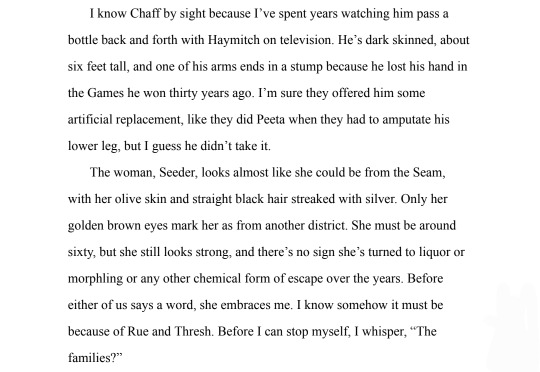
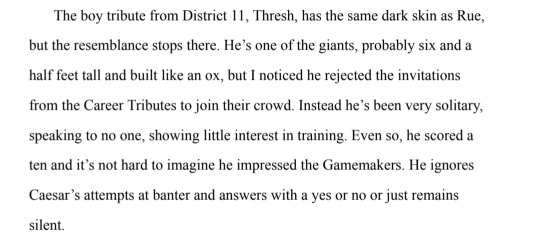
(rue, chaff and seeder's descriptions, but thresh, too.)
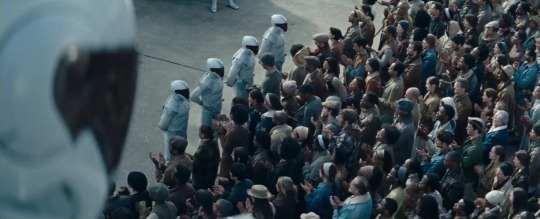
(depiction of district 11's population in the movie adaptation of catching fire.)
𝐬𝐨, 𝐰𝐡𝐚𝐭'𝐬 𝐭𝐡𝐞 𝐩𝐫𝐨𝐛𝐥𝐞𝐦?
genuinely? the characterization of these individuals, such as chaff and thresh (both black males specifically.) the portrayal of both characters being a threat in size and combat, which is also often a microaggressive stereotype tied to black men.

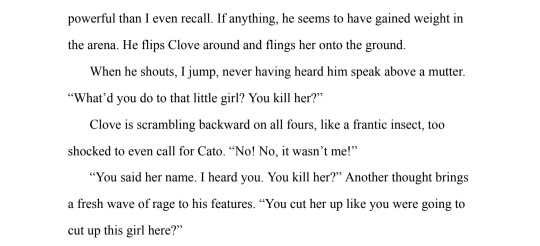
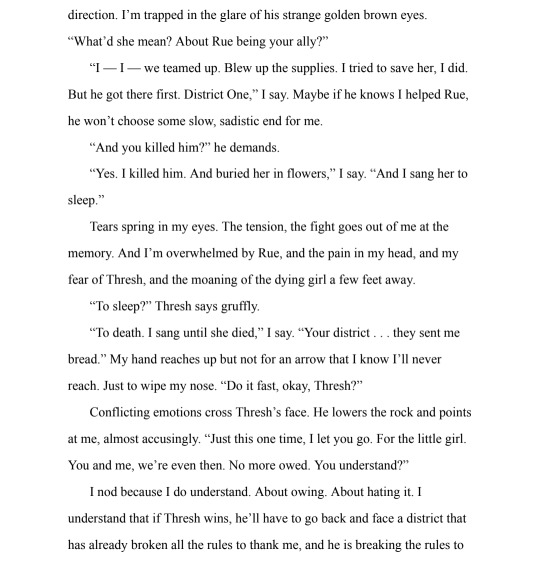
(effie's reaction to the 75th's reaping & her snide comment against chaff, catching fire + thresh killing clove/sparing katniss, the hunger games.)
of course, i won't downplay thresh's kindness in his sacrifice of sparing katniss, but the display of his brutality paired with his decent & race does not look good (considering that the hunger games is written by a white woman!) and to me, will always come across as uncomfortable. even his speech makes him seem uneducated, more brawn than any brain, and that's also a heavy misconception when it comes to black men/boys/etc. i can see where suzanne tried to balance it out, but it doesn't work well in the slightest.
furthermore, we have to talk about the state of district 11 as a whole.
agriculture/farming as the role for one of the largest districts if not THE largest, seems innocent by itself. but then you have the treatment of its citizens, the way the population is worked, and the overall uneasiness of it.
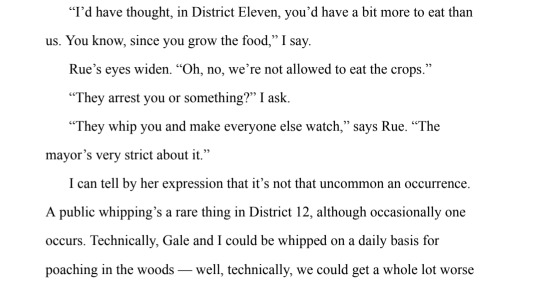

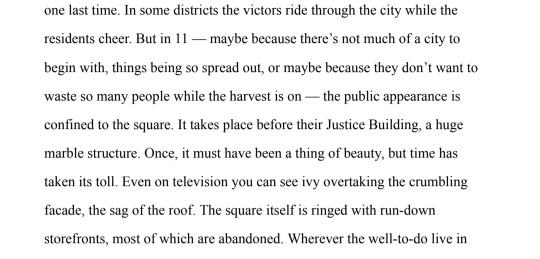
(rue's experience in 11, the hunger games + katniss’ description of the district, catching fire.)
public whippings, senseless cruelty towards again, a WIDELY black populated district and their continual work on fields/in harvests all speak to remnants of slavery and pastimes taken place within the era of slavery. if suzanne collins was trying to make a point, or mock the treatment of this minority through a portrayal in her book as a white woman, she missed the mark POORLY. having the BLACK citizens, including women, children and men all working out in the fields? disgusting. beyond incomprehensible.
hoarding a minority in one district is crazy work too, because we barely hear about any other black characters minus paylor, beetee, and potentially cinna. and the fact that in katniss' eyes, 11 is treated perhaps the worst? says a lot.
𝐰𝐡𝐲 𝐦𝐚𝐤𝐞 𝐚 𝐩𝐨𝐬𝐭 𝐚𝐛𝐨𝐮𝐭 𝐢𝐭?
truthfully, i'm bringing awareness to my discomfort as a black teen/general black individual because this isn't just something you should brush past. you should see the treatment of these characters and condemn it. i see next to no posts about the blatant racism towards black people/poc in the hunger games and also within the fandom. this has been swept under the rug over and over and blatantly, I'm tired.
collins perpetuates the suffering of district 11 in historical and supposedly educational ways, but that doesn't make it okay for her to do so. as a white woman, collins abuses the usage of racial stereotypes with examples of district 11 men, the culture, their work, but also a wider environment than just 11, such as district 12 too (with the perpetuation of gale.)
#before you tell me “this is a stretch!” PLEASE read the post. literally read and research if anything#because this isn't something to be argued about#you should listen and hear black voices and understand where I'm coming from with this#because having thg as my special interest means a lot to me#but i will not ignore it's problematic bits for the sake of keeping peace and tranquility within a pretty ignorant fandom#the hunger games#the hunger games trilogy#thg#catching fire#mockingjay#rue barnette#rue thg#seeder thg#chaff thg#thresh thg#please don't argue with me in reblogs/tags/comments either. especially if you're non poc because i simply do not care#and please treat this post with the respect and kindness it deserves. i see my non-serious posts get from 20-50+ likes at least#so prioritize this just as much as you would any other post of mine
45 notes
·
View notes
Text
Part 1: Why is Nettles black?
TLDR: George subverts a bunch of stereotypes specifically tied to black women in media with Nettles, she's black, innocent, not practising magic, young, doesn't nurture or take care of anyone and her own sexual experiences aren't exploited in her narrative rather in a projection of someone. The closest she comes to any other race is when they call her a dragon lady at the end, which is an Asian stereotype but not something invoked to critique. Nettles is black.
So I said it before, but now again, this is a two part post because when it comes to this character, I think the relevance of her race is often lost because of what is percieved as a greater narrative purpose. But Nettles race and specifically her being black is important to her story. The next part will delve into her role in the narrative as a black girl, but this part is generally why I can say she's black with confidence using the written narrative.
STEREOTYPES/ TROPES
There are multiple stereotypes used to box black women in specifically from the inception of race in media. Some of the most prominent are the (in great reduction to the nuance):
Sapphire: angry, loud, and rude black woman
Jezabel: sex driven, lust bound, and seductive black woman
Mammy: nurturing, sexless and typcially bigger black woman.
Magical black woman: linked to some sort of witchcraft practice but not central to the narrative. Not to be confused with the magical negros trope which is different.
Tragic Mulatto: mixed raced stereotype that they belong no where.
Ghetto: I saw this recently, but this is basically the hood girl trope.
Grown black girl: this is when they treat black girls as older than they are, like adults when they are kids.
These concepts have smaller sub tropes, and there are more stereotypes, but even to this extent, there is a battle with media literacy when it comes to the way people see black female characters in media.
For the sake of Nettles, we'll be covering all in the next part. Along with the history, seeing as most if not all the origins for these tropes can be found in Slavery.
SUBVERSIONS.
With the sapphire trope, George manages to give Nettles these characteristics and add on to them, so while they are a part of her character, there is depth and nuance. She is rude, called foul-mouthed in the narrative, but she is also fearless and smart. She never gets angry in the written narrative, but she does cry and mourn and show an emotional intelligence we don't get from all her peers. She defies the expectation of a rude, lowborn character being crass, lusty or power hungry, and jealous alone.
The Jezabel story is a perverse fantasy. A black woman is solely driven by lust and desire, nothing more than a sexual object. It's a trope that actively harms young black girls as well. So, in the books, whether or not you believe Nettles has sex, she isn't solely there for it. She isn't just there to have sex with Daemon, and when it is brought up, the men around her prioritise the innocence of her youth rather than the treason she is said to commit.
Nettles doesn't really fit the many trope as she is younger than the trope typically allows for but within the narrative of all the connections we could've gotten we got one with a Prince rather than with children to communicate the fact that she loves but she isn't a care taker.
The magical black woman stereotype or black witch stereotype is rooted in the both spirituality and abuse. White women would use both the Jezabel stereotype and this one to claim that the reason their husbands would sleep with the enslaved women of the plantation were because they were sexually deviant seductresses who ensnared the men basically.
This is the clearest stereotype George both evokes and subverts. He purposefully wrote that in to draw a real world parallel and subverting it in his book.
Lastly, the tragic mulatto stereotype is the trope of two white for the black side to black for the white side. Basically, they are sad because they have nowhere to belong. Interestingly, George doesn't use this at all. Which to me was an indicator that Nettles doesn't have this complex. All the people of colour, especially the brown skinned ones, have a complex relationship with the Valyrians, but Nettles doesn't.
ONE EXCEPTION.
This isn't really an exception, but more so a name he uses that is tied to a trope. Nettles is called a dragon lady out of context of the stereotypes in the books. The reason I brought it up was because a lot of people seem to think Nettles could be any kind of brown in the narrative, which isn't exactly correct. The dragon lady stereotype is tied to many Asain women, but the content of it isn't tied to Nettles past the name.
I think we have moved past the need for the Ghetto trope. It's basically someone who grew up in an urban, low income area and whose behaviour represents the culture there. I don't think Nettles is a victim of Reaganomics so I don't think she's affected by this.
Nettles is also purposefully treated as a young lady in the narrative. She's the Westeros equivalent of 18 and is treated by the men of her narrative as a girl. She's called a child, said to be innocent and freed from her sentence because of it. The exception to this is with Daemon Targaryen, who sexualises her narrative, but it isn't meant to be explotative AS IT IS WRITTEN. It's presented as love.
OVERALL.
George uses black women stereotypes and tropes in media and subverts them with Nettles. He specifically uses her appearance to justify it and allows him to communicate with race without saying it out loud. Nettles is a black character written in a story where she can defy the media conventions of her identity. She is back for a reason and none at all.
#nettles#nettles asoiaf#netty#fire and blood#a song of ice and fire#black tropes in media#race in media#black characters#black stereotypes#asoiaf#asoiaf meta
31 notes
·
View notes
Note
You’re a whole coon, of course Rhaenyra hates women, especially Black women, she tried to murder a 16 years-old Black girl, slut shamed her, called her racial slurs, and linked Nettles “ugliness/attractiveness” to her Blackness. Rhaenyra literally acted like a pathetic pick me in regard to Daemon and Nettles. If given the chance, Rhaenyra would have enslaved her. TB must truly despise Daenerys to compare her to Rhaenyra, they couldn’t be more different. (The way Rhaenyra is never mentioned in Dany’s chapters and GRRM has never discussed them in conjunction with the other, finally y’all can thanks HOTD for turning her into a progressive and flawless Mary Sue).
And really an insanely privileged white woman dying after putting a bounty on a lowborn Black’s girl head should be a good thing right ? We just gon have to celebrate Rhaenyra death with Nettles.
If you say so, anon, I guess I'm a straight up coon. 🤷🏿♀️
I suppose arguing how no one can be a feminist in a medieval world is coonish bc feminism didn't exist in such settings. I guess that pointing out how un-constructive it is to go "she wasn't a feminist so we shouldn't care about any possible effect her coming into power like the men before and after her have been able to will have an effect on other noble women's power to maybe implement some pro-women stuff in their own domains" to us analyzing why/how Rhaenyra is important to the history of Westeros and Daenerys is coonish.
I ues it's coonish for me to point out that Rhaenyra's story, for good or for ill, is one of te most well-contextualizin stories of F&B towards why te Targs lost after years of patriarchal assimilation and that Rhaenyra's story is so clearly a "commentary" about mobilized patriarcahal violence AND reveals sexist propaanda in REAL TIME.
I guess it's coonish of me to flout so many non-Nettles arguments of Rhaenyra's supposed bad leadership and amorality not once, but TWICE (that I remember), where it clearly just veers into straight up sexism: HERE and HERE....thus coming into why I even bother defending Rhaenyra (in some points).
It's not like I haven't already wrote several time in several posts how Rhaenyra's trying to get Nettles' head reveals much about the Targ-Andal paradigm she grows up in and tries to use to bolster herself through her going after Nettles to the end. It's not like I don't see how essentially different Daenerys and Rhaenyra are as people through the Nettles event as well as how they grow up and come into their positions of power and how/why they desire those roles:
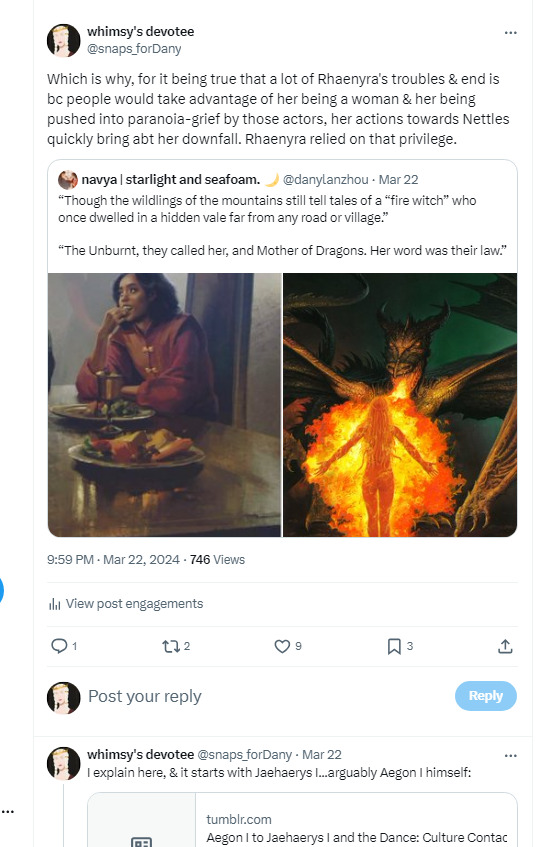
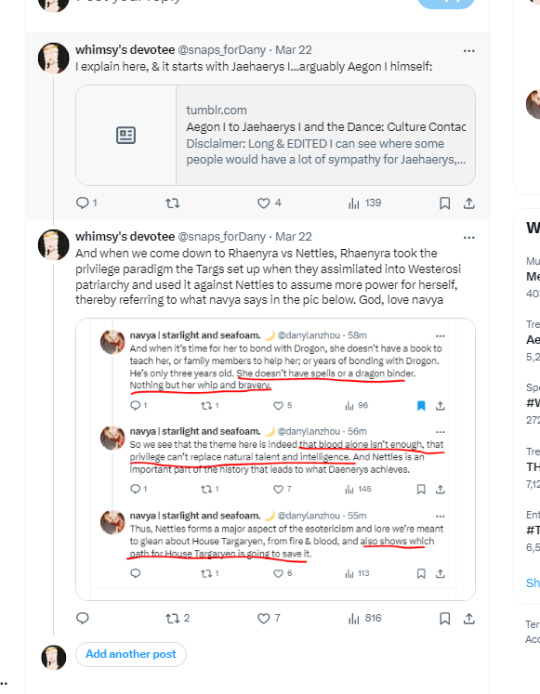
It's not like I haven't already written about the Black Jezebel stereotype at least three times, including on Twitter and here. It's not like I have defended Nettles not just from "dettles" stans but also from people who call themselves Rhaenyra stans while bashing on Nettles and Mysaria, totally misunderstanding both characters and what even a supporting character is.
But sure, I'm a coon bc I don't want to ignore the journey of Rhaenyra's downfall and make distinct where she decided to destroy another woman vs her being the victim. Sure, I'm a whole coon.
And for the last fucking time, "compare" does not always or only mean "these two things are exactly alike and I will show you how"! "Comparison" analyses means that you will list out what traits or developments two things have, what inspirations, and see how they differ and how they don't. And through such a process, you will find out how many and how well/or not these two or more things are alike and how.
For Dany and Rhaenyra, I never said these girls/women were the same person. I said that both women, as women in male-designated positions of power, have to deal with people in world AND out of world must contend with misogynist feelings towards of their not deserving power or leadership on account of their gender, no matter what sort of characterization either had BECAUSE even with the main series not being like F&B, not being a history book, PEOPLE IN THE FANDOM STILL TEND TO MISREAD OR TWIST DANY'S ACTIONS AGAINST HER CHARACTER AND GRRM'S INTENT. Rhaenyra is meant to contextualize that very experience into a real event of catastrophe, she was set against ever since she was 10 bc she was female and another, older woman wanted power denied to her directly bc she was a woman. This is a fact, you nor I can change that. There is a difference between what we learn from the events to make the conclusions of who should rule ideally and what we should shoot for VERSUS thinking of the situation at hand for what it would have been like for the character.
F&B (having been written after the main series) continues even this "analysis" phenomenon; what do people choose to believe when it's a woman at the center of their stories?! No matter her real circumstances or their knowledge of things not present in their understanding of the world and of history?
I also mention, several times, how it is here, Rhaenyra's end, where the Targs lose their dragons because they have assimilated into the intenser patriarchal paradigm already mentioned to the point where they weakened their women's positions by denying them their autonomy and political powers...which plot sequence wise leads to the end of the dynasty as whole and Dany's exile. I'm must be a coon to not want Nettles, a 17 year old, to fuck a 50 year old, esp with her being his bio daughter. No, anon, I am too repulsed with direct vertical incest (parent-child, grandparent-grandchild, etc.).
Then there is how the Bloodstone Emperor and the Amethyst Empress and how the former usurped tha latter and plunged the entire world into mythological "darkness"--thus leading up to the importance of the Azor Ahai, aka Dany, directly seems to reflect how another brother--Aegon II--usurped his older sister--Rhaenrya--and thus the world loses a strong magical tool against darkness "dragons". An obvious link....
In fact, I tend to repeat how different they are as people! There's this whole thread talking abt the very thing I despise abt some critiques of Rhaenyra. I even say many times that Rhaenyra couldn't have the throne after the Nettles letter, that at that point, there needed a "refresh". Up until then, there was simply more reason for us to not think her a real terror except for maybe Addam and Alyn. But I have my misgivings there and it comes down to timing and grief.
No, Rosby and Stokeworth do not count and why? I already wrote why, but for someone who doesn't stan Rhaenyra or is not a fan of hers but actually stans just Daenerys--the previous ozymalek says:
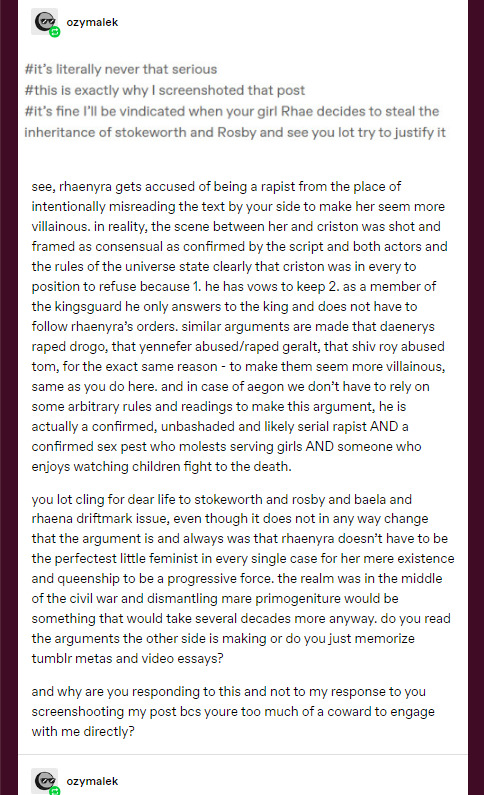
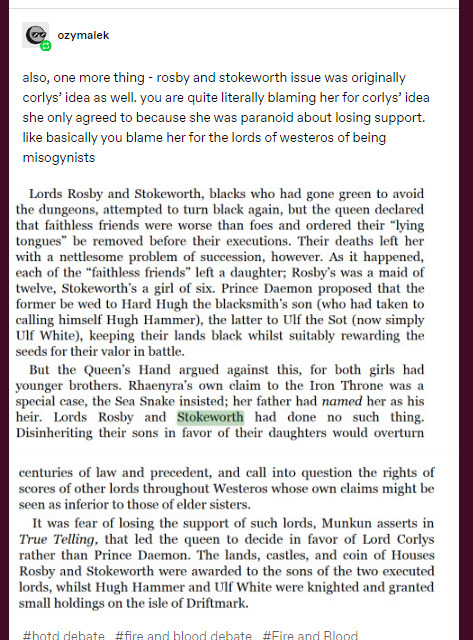
I have myself said several times how I disliked how they rewrote show1Rhaenyra to make her a much less assertive version of herself, and I agree with others how they made her female-friendless. No matter how amoral or moral she was, similarly to Dany, people have written her sexistly in the show. I believe that this is CENTRAL to the point of F&B, how people refuse to see the point of it.
Finally, I really don't see how the hell show!Rhaenyra even is a Mary Sue or a NLOG, bc for the first, she displays no skill she excels over others at. A Mary Sue is:
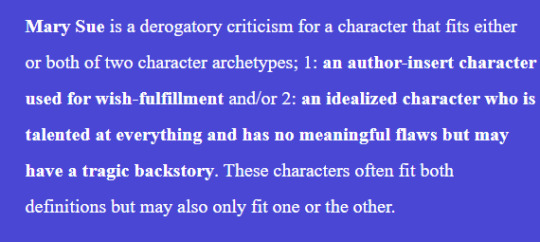
Show!Rhaenyra, for some reason, seems "perfect" to some people. Esp with Luke saying so in epi 8. I never felt that way, I always thought she (older, not younger) was too meek and that is her great flaw---due to the sexist writing, but if kept at face value, that's the great flaw. Other definition: Who is inserting themselves into her character on the show? you got proof?
A NLOG (not like the other girls) is a Cersei like character who goes out of their way to destroy/diminish most women who are competitors for their power or destroy any semblance of socially-defined femininity and socially-coded feminine "weakness" so as to appeal to the male authority and get privileges. Problem is that EVERY SINGLE FEMALE MONARCH AND WOMAN IN SOME SORT OF AUTHORITY OVER MEN IN EVERY SINGLE PATRIARCHAL SOCIETY had to convince their male supporters that they were the one they should follow to some degree more than any male heir or candidate--during a time where they had to either fight for their "birthright" or they were planning coups (Catherine the Great), came into power through some accident, or whatnot--that their rule was in it for them. There is no pattern of woman-hating or self-hating to define Rhaenyra as a NLOG, where she consistently tries. NLOGs tend to hate women even in their own "race" or group for perceived acts of upheaval and destabilizing their positions of power. Alicent was and she uses misogyny to do so, so Alicent is not Rhaenyra's victim; other way around. Rhaenyra has all reason to despise Alicent, justified even. It's more than the positions, it's the whole targeting since 10 deal and trying to espouse Rhaenyra's inherent unworthiness for power.
So Rhaenyra deciding to do the Rosby/Stokeworth bit is her seeing how her greatest ally, a sexist man, has basically all her ships during wartime and insisting she does not give those girls their father's seats is Rhaenyra choosing wrongly, yes, but something I don't think that you or a small number of women would bow under considering the other shit she was going through. Yes, even black/PoC women. Again, this is not about Nettles but about women vs women (yes with them all being white or white-adjacent) bc I know that this will be the next thing some will say as a counterargument to what I'm saying here.
You are correct, however, in how similar Rhaenyra's behavior abt Nettles is pick-me-ish and NLOG concerning her intent to turn Daemon back to her and how this was her seeing Nettles as competition for "control" over Daemon, who was one of her principal military commands as well as her romantic partner...and like i said once before, this is a reflection on how this Andal-Targ patriarchal paradigm makes its own female "terrors" through misogyny. To ignore the process is to endanger its justified repetition. Yeah, Rhaenyra ends up becoming like Alicent in that way after the consistent losses, and I mean defaulting back to destroying another woman for a simulation of power. This doesn't mean that she was a feminist or that she didn't intend on using the Black Jezebel reasoning to get rid of "competition" to feel more in control. It does mean that her behavior reveals her enmeshment in the xenophobic, aristocratic, patriarchal Targ-Andal feudalist paradigm that she chooses to use to, again, construct more feelings of power at a time where she seemed to feel she was losing more and more--after the betrayals and the deaths of her sons in that moment. And yet if there is anything to be extracted from her narrative it is how that built-in classism (the companion and parent of racism) can become the thing these women default onto to retrieve/gain the agency & power denied to them. I believe this is also where you can draw a core similarity to Cersei, who is rather the starkest extreme example of that classism making up for her internalized misogyny through her Lannister Exceptionalism.
The discourse has to include how we, the readers, over-blame Rhaenyra for things she has either very little control over or what she had no control over and for trying to, again, assert herself (before Nettles). She's a reflection of her times and situation; doesn't mean she isn't still a victim. You don't need to like her. I never asked for people to do so. I don't care if you do or not, I've never needed that. Just don't lie or twist information or ignore clear patterns GRRM establishes that are also important, or try to erase the lines of harm done to her and undo the work GRRM is doing to point out this pattern of misogyny that contextualizes one very key aspect of Dany's journey: sexism doesn't care how good or classist you are, you are a woman so you will be subject to disenfranchisement, distortion of facts, and destruction...if you are not like Dany, who intuitively and "rationally" discovers lanes of power while reintegrating her being to the natural process and relationships between herself and her dragons for the ecological benefit of the entire world (the Others, again). Unlike Rhaenyra, Dany doesn't fall into the ideological "trap" or the noblewoman's save-grace of exploiting of lowborn people AND dragons but intelligently seeks other non-exploitative ways to use her dragons and those inspired by he bravery. This again, does not erase or override the sexism and specific elements of gender politics that tie these two together.
It's a paradox, not a contradiction.
#asoiaf asks to me#rhaenyra's characterization#rhaenyra targaryen#fandom nonsense#rosby and stokeworth#rhaenyra and feminism#hate asks#azor ahai
19 notes
·
View notes
Text
And finally....the moment of truth...
So ive been working at a movie theater over a year now and used one of my movie passes to see Beetlejuice beetlejuice and my short review of it?
SPOILERS BELOW
3-3.5 out of 5 or 6-7 out of 10 so good/pretty good like slightly above mid.
But I still liked and enjoyed it a lot, it was fun and I liked the nostalgia fuel being a fan since childhood in the late 90's and 00's and I plan to see it 2 more times, once in 4DX (thank you employee discount). I also have merch put aside for me at work lol
The good
It was fun, well acted, practical effects were great, music was well implemented into their scenes and great choices of music, Catherine O hara stole the show as Delia, sets looked amazing, especially the netherworld iim glad we get to explore more of it.
I liked the jeremy twist (although the hints were kinda obvious to me At least to me). Their parallels to Beetlejuice and Lydia were good and i also felt a parallel between Jeremy and Beetlejuice's teen death rocker alter ego he used to trick lydia from the original unused script, Maybe iits just mee tho.
It is sad to see Lydia become a shell of herr self over the years not tto mention addicted to pills but i think its an interesting way to go especially with her ptsd from beetlejuice, I can see it. (I just wish they used this more as an explanation on her current state and the rift in her relationship with Richard and Astrid as well as as lydia's powers)
I enjoyed the parallels too the musical seeing lydia sort of adopt Charlie's role and astrid be in the shoes that musical Lydia was interesting. Not sure how intentional it was with that or if it was intentional at all tho.
the not so good
The begining slogs a bit, and once we pick the pace up it feels rushed especially during the wedding after the musical number (which Was good), other parts seem rushed too, it feels like a lot going on at once like they pushed multiple ideas for sequels all together which also gave a lot of new characters barley anything to do and made me feel liike they're kinda useless.
I love Delores, im absolutely self shipping with her but it feels like shes just there for eye candy and to be the ficy "other woman" trope.
Willam Defoe's character is fun in theory especially a cocky actor/stuntman playing a cop who died from a scene and is a wannabe cop in the afterlife but in execution he feels pointless.
I wanted to like Astrid more, im glad she wasn't like horribly written, I LOATHE when activist characters especially young ones are written by people who make them unlikable and obnoxious but she felt kinda .... boring sorta like a bit of a rehash of movie and musical lydia (with a dash of cartoon) in one but we only get glimpses into her interests and a lot of it is similar to Lydia even the activist part. And yeah obviously she can share interests with her parents I get she probably got it from them but i wanna know other stuff about her. Although a thing i do like is she is a sceptic while Lydia knows the paranormal exist.
Sorta related to that above there's a bunch oof cool ideas i wish weren't rushed through or they'd explore more.
we also get more netherworld lore which is cool and good but some of it leaves more questions then i had for years with the original.
lastly because this is my biggest Tim Burton beef is that there was still racial stereotypes in the film, he has learned bit over the years with Wednesday but it's still obvious he has some way to go with the Asian dry cleaner and the Soul Train scenes where we see most of the black characters in the film mind you probably the most black people we've seen in any Tim Burton film LOL (speaking as a black fan)
WOW uh I wrote way more than expected lol i have more thoughts but that's it for now, hopefully I will be posting here more in the near future.
9 notes
·
View notes
Note
honestly no i don’t think it’s weird at all to be upset about the exclusion of satin in the show.. if anything though as a gay guy im pretty glad they didn’t have him if loras is any indicator.. imagine them with a fairly effeminate gay coded character? no thanks 🫣
Loras was a sign of the end times 😭 I think I’ve made a joke before that if JonCon had been included he probably would’ve been written like one of those modern family dads and I feel more and more right each passing day.
Gonna rant a little (a whole shit ton like it’s really long I’m so sorry I got carried away) about gender and sexuality in ASOIAF/GoT here because I’m a lesbian and obsessed with analyzing these things :
tldr; D&D set up gender roles/rules where there weren’t previously any, and removed and added character traits as they saw fit (especially looking at feminine = gay and masculine = straight). If a character did not fit their perceived mould, such as Qarl the Maid, Jon Connington, and Satin, and could not be altered to fit that perceived mould, they were cut entirely. They also, in a possible attempt to be more relatable to a gay audience, introduced systematic religious homophobia where it was not previously, brutalizing their gay character. They wrote them as stereotypes and ignored them if they could not possible be shaped into one of their stereotypes.
GRRM obviously plays with gender roles and dynamics with his characters, yet D&D makes it so black and white. Gay people are all effeminate men. Hell, even Asha/Yara falls into this. She and her lover Qarl are a major fuck you to westerosi gender roles and expectations. He’s an effeminate man and she’s a masculine woman in a dominate powerful position. Yet he’s removed from the show. Absolutely no hate to queer “Yara”, but it is interesting in hindsight how that ended up working out. Had she been written differently, I’d argue that bisexuality compliments her character - if it weren’t for the history D&D has. When they do play with gender roles, it’s so tacky and one dimensional and ends with weird, nonsensical scenarios of female badassery with none of the development present in the books. Then, on the other hand, any vulnerability or deviance from societal expectations that male characters experience are wiped clean. Jon Snow is made into a generic fantasy hero type. Men who are seen as “weaker” or more “submissive” are brutalized on screen as torture p/rn, as shown with Theon Greyjoy. And men who are gay must be effeminate or promiscuous in one way or another. Loras deviated from that, so he had to be stripped of his defining traits and turned into fan service. Satin deviated from that even more, being a sex worker, and was stripped from the show entirely. Loras didn’t sleep with men enough, and the show writers wanted to change that. But Satin slept with men too much, and was in too close of proximity narratively and physically to fantasy hero Jon Snow. They wanted gay sex depicted in an easily digestible way for their perceived cishet audience, and found the idea of a boy selling his body to survive abysmal and not appropriate for such an audience, though they had no problem exploiting female prostitutes for the pleasure of the viewers . And in a weird attempt to be “relatable” to modern audiences, d&d introduced a self imposed barrier: homosexuality being illegal. Likely thinking that gay audiences would love to see their favourite gay Loras Tyrell brutalized and spat upon, D&D did exactly that, failing to realize that gay audiences would much rather see a queer character existing in a dark fantasy without their sexuality being what puts them in danger, compared to seeing something they already witness every day (religious-motivated violence and persecution) thrown into the show. Like it’s such an insult to the source material, especially considering that the 1990s book that hardly makes explicit references to the relationship of Loras and Renly does a better job at making them likeable, well developed characters than the “modern” 2010s tv drama. The flower crown, rainbow, cutesy edits dating back to the early days of Game of Thrones is a far cry from the depiction of politically savvy Renly and brutal and bloody Loras in the books. And the show just kind of encouraged that view of the two, as the cutesy gay boy fan service, hairless as a newborn baby and scared of blood. On the topic of JonCon, it would have been near impossible to introduce him and have him fit this set rule of “effeminate men = gay” and “masculine men = heterosexual”. JonCon is an intimidating, stone faced character who’s demeanour is hinted at being similar to that of Tywin fucking Lannister, as Tyrion almost accidentally refers to Jon as “father”. Aka, Jon is scary af. He’s older, grey, potentially dated the ugliest man in Essos who was also significantly older than him, and is also a father. Hardly a character that can be put into the set limiting roles of the show.
I’m honestly going to stop myself right here this is getting too long and I should just sit down and write an essay 💀 like genuinely I should write a paper
#ONLY THE TOP PART IS A REPLY TO THE SUBMISSION#the rest of it is my own thoughts thrown down as they came to me#realizing the wording makes it sound like lesbianism introduces a biological tendency to analyze stuff aldkakd oops
27 notes
·
View notes
Note
OMG, I didn’t know you loved Falsettos!!!
Honestly, I’m still waiting for someone in the GO fandom to make a Nina/Maggie video with «Look, look, look, it’s a lesbian from next door!»
I do!! It holds such a special place in my heart because it was not only the first place only saw positive representation of homosexuals, but also positive representation of lesbians specifically. To see lesbians in a happy and healthy relationship, who have hobbies and interests and aren’t walking stereotypes, and who proudly call themselves lesbians…that meant so much to me as a kid who was still struggling to even use the word “lesbian” for myself because of how tainted it is by lesbophobia and porn.
I’ve been meaning to make a post about how good Falsettos is and try to recruit people to listen to it, so I’m going to use this as an excuse to say that it’s SO GOOD. It’s a concept that could’ve easily been done really poorly, considering the plot is a gay man divorcing his wife to go off with the man he’d been having an affair with (pretty similar concept to OFMD, for those who are fans). It could’ve easily demonised Trina (the ex-wife) and turned her into the evil overbearing ball and chain wife, and it could’ve easily demonised Marvin (her ex-husband) for being gay and leaving his family for a man. It also could’ve easily demonised Whizzer (Marvin’s partner) for being a “home wrecker”.
But instead, everybody is cast in a neutral light. Trina’s struggle with the thing with Marvin is acknowledged and she’s not written as a horrible homophobe for it. But at the same time, it’s acknowledged that she’s having difficulty getting with the times yet is trying her best to come around. I just think she’s a surprisingly well-written female character considering the writer is a man. I mean, just listen to this song. And huge props to Stephanie J. Block for bringing so much emotion to it.
Then Marvin is obviously struggling because he’s a deeply closeted gay man…but that doesn’t ever excuse his misogyny and abusiveness. He’s villainised for both of those, and it’s deserved, but he never gets the homophobic “evil gay man led on a woman for years and then leaves her for a man, gross!” Treatment.
And Whizzer seems to struggle with guilt over being a factor contributing to Marvin and Trina’s divorce (in a song he says “I’m sure his divorce was a tribute to me”), and Trina really does not like him at first…but never once is the audience led to hate him.
This is probably an oversimplification of things, because it’s a 2 hour musical and it’s been a while since I’ve watched it…so it’s hard for me to fully sum up my thoughts. Basically, I just really love how all of the characters are complex. They’re not written in black and white, and they’re allowed to have flaws without being hated for it (Marvin’s abusiveness and misogyny being the deserved exception). And with such a sensitive subject matter, this is such an important thing to have. It’s the same praise I have for OFMD, where Stede’s assholeness is acknowledged, but his “discomfort in a married state” is never demonised. And Mary gets to be a complex human who isn’t just shoved into the role of The Wife.
In short, Falsettos is really really great and the music is amazing. So if anyone managed to read this far, go listen to it!
Or watch it. This totally isn’t a professional recording of the 2017 revival on YouTube.
Anyways. Part of me does want a “lesbians from next door” edit of Nina and Maggie. The other part of me wants the GO fandom to stay far far away from Falsettos, because I know damn well they would not Get It. I remember being in the fandom in middle school and a lot of people would give Whizzer the Fanon Crowley treatment: transing, feminising, sexualising, woobifying, etc. the feminising in particular always bothered me because Whizzer explicitly states that he hates that kind of treatment when Marvin tries to shove him into a housewife-like role. I do not trust the GO fandom to listen to him.
1 note
·
View note
Text
Tumblr Post #1: Diversity and Multiculturalism in Jane the Virgin
Jane the Virgin, a hit Netflix TV series following the life of Jane Gloriana Villanueva, a 23-year-old Latina who finds herself pregnant after an accidental artificial insemination by her doctor. The episodes show Jane and the baby’s father Rafael Solano as their lives change with drama and heartbreak. The telenovela is narrated by a seemingly unknown narrator, however is later revealed to be Jane and Rafael’s son, Mateo. Directed by Justin Baldoni and starring Gina Rodriguez, Justin Baldoni, and Yael Grobglas, this TV series strikes the heart of many and shows the struggles of parenthood, as well as the importance of their Hispanic culture.
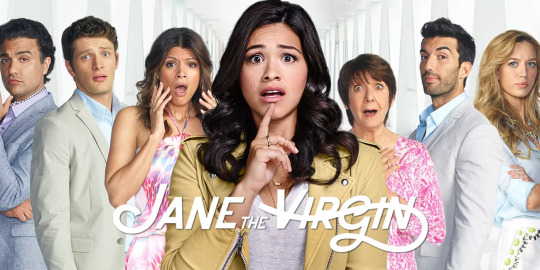
Jane the Virgin directly displays many of the course topics in ART 150, including the idea of multiculturalism and application of White perspective on a non-white family. For example, in “What is Multiculturalism” written by Gregory Jay, he states, “The concept of ‘multiculturalism’ also has a history rooted in theories of human rights, democracy, human equality, and social justice” (Jay 2011). This is extremely applicable to Jane the Virgin as one of the show’s most important themes is the importance of heritage, maintaining one’s culture, and being proud of where they came from. Jane’s grandmother, Alba Villanueva, was an immigrant who came to America to follow her dream, and she constantly is expressing their Hispanic culture, as well as speaks in Spanish to help remind her daughter and granddaughter who they are and where they came from. Additionally, Richard Dyer in “On the Matter of Whiteness” writes, “The media, politics, and education are still in the hands of white people, still speak for whites while calming and sometimes sincerely aiming to speak for humanity” (Dyer 2003). In the TV series, there are many times where Jane or her son Mateo are discriminated against or underestimated because of their race. It is made obvious to the audience that oftentimes white people overgeneralize and stereotype certain races for the entire population, and Jane’s family activity combats this through their careers and writing.
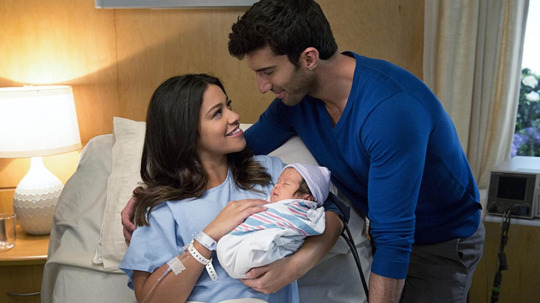
Continuing, Jane the Virgin also displays intersectionality in the two main characters- Rafael and Jane. In a later season, Rafael discovers his biological parents are from Italy and are not Hispanic, changing his entire identity. Similarly, in the article “Black? White? Asian? …” by Susan Saulny, she explains, “Multiracial and multiethnic Americans… are one of the country’s fastest-growing demographic groups” (Saulny 2011). The struggles and highs of having an identity in more than one race is shown as Rafael learns to accept and redefine himself as an Italian and Latino, a concept recently discussed in ART 150.
Another way intersectionality is displayed is through Jane, who struggles with balancing her identity as a Latino woman, mother, writer, and daughter. Rather than dismiss some of her identities and prove others to be more important, this TV series allows Jane to realistically and sustainability balance her life in a way where she can be proud and active in her culture, as well as succeed in a career and as a mother. This is very important because there are many stereotypes displayed in popular visual culture, such as feminism dismissing maternal roles, or Latina stereotypes within immigration, religion, low income, criminal activity, etc. Jane the Virgin shows that Jane is an active and brilliant Latina whose grandmother is an immigrant, but has been able to provide for her family. This series disrupts the ideas closely related between ethnicity and negative assumptions, specifically assuming that migrants will be involved with criminal activity or will have a low income. There is a great importance in displaying the beauty and power of a Latina woman who has access to just as many opportunities as anyone of any other race (specifically white).
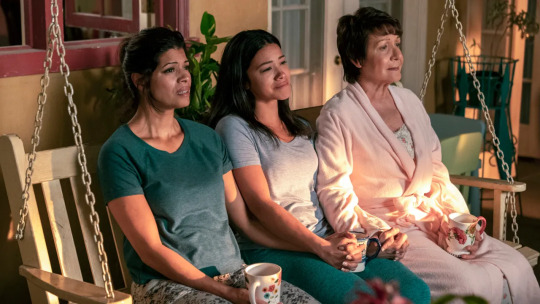
Furthermore, many discussions held in ART 150 are applicable to Jane the Virgin, specifically in the diversity that the TV series intertwines effortlessly into the plot. From having the main character be a Latina woman, to breaking stereotypes about Latina motherhood, Jane the Virgin displays multiculturalism and intersectionality in popular visual culture in a unique way. Rather than using humor to gloss over cultural struggles and discriminations, or having colored characters “not fit in” to ease the awkwardness, the series uses empowerment and raw emotions to convey its characters in all dimensions- identity, culture, age, and history.
Work Cited:
Dyer, Richard. “On the Matter of Whiteness” International Center of Photography, New York. December 2003.
Jay, Gregory. “What is Multiculturalism?” University of Wisconsin- Milwaukee. July 2011.
Martinez, Diana. “‘Jane the Virgin’ Proves Diversity Is More Than Skin Deep” The Atlantic, October 19, 2015, https://www.theatlantic.com/entertainment/archive/2015/10/jane-the-virgin-telenovelas/409696/. Accessed 12/2/23
Perez, Lluvia. “Jane the Virgin’s Impact On American Viewers and Latinx Storytelling” Teenvogue, August 1, 2019, https://www.teenvogue.com/story/jane-the-virgin-impact. Accessed 12/2/23
Rose, Lisa. “‘Jane the Virgin;” The CW.
Saulny, Susan. “Black? White? Asian? More Young Americans Choose All of the Above” The New York Times. 29 January 2011
Torres, Rae. “‘Jane the Virgin’ Cast Guide”. Collider, October 2, 2021, https://collider.com/jane-the-virgin-cast-now-where/. Accessed 12/2/23
1 note
·
View note
Text
136. Man vs Beast, by Robert Muchamore
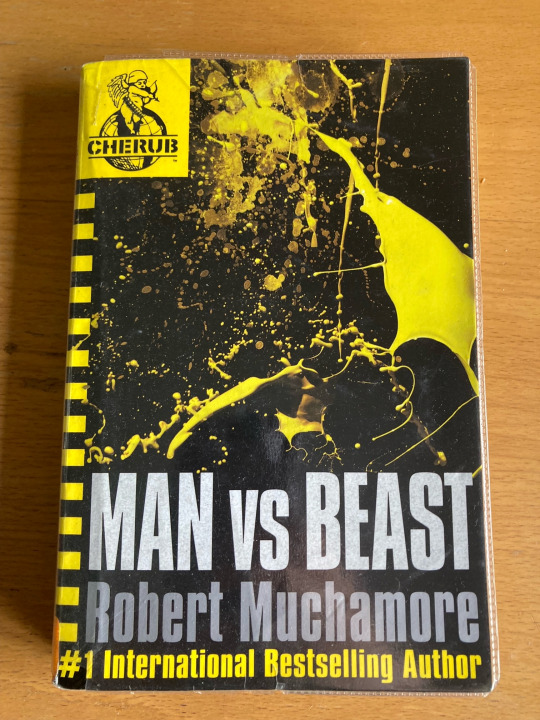
Owned: No, library Page count: 295 My summary: Help Earth is back, and trying to save the world again. This time, it's animal lives which are the focus. There's an extremist group planning something big, and time is ticking before their plans come to fruition. Enter James and Lauren, undercover spies working to smoke them out. But with no clue what their plans are, can the kids save the day in time? My rating: 3.5/5 My commentary:
Back to CHERUB for some environmental extremism! This one seems topical, almost, given the climate disaster we're currently enjoying - granted, the extremists in this book are more about saving animals than saving the planet per se. Once again, James and Lauren are posing as siblings (easy for them, given that they're real siblings) along with Kyle. They're out with senior mission controller Zara, who's shown up a few times before, and a member of this vegan group who has turned police informant to try and weed out the violent members of the group. So…ready for a mid-2000s view on militant veggies?
As ever with CHERUB, most of the veggie group doesn't actually come across too badly in this. There's a clear distinction drawn between the non-violent protestors, who do things like picketing labs that experiment on animals or rescuing animals from captivity. They're also explicitly stated to be mostly middle class white old dears, the kind of people who've retired and don't really have much else to do but stand around holding placards about saving the bunnies. The real extremists, the militants, are younger and angrier…but once again, I have to take issue with how black and white the morality is. The extremist group attacks and nearly blinds a woman who seems to just work in admin for some lab and doesn't have much to do with animal abuse. The climax revolves around them kidnapping a TV chef who also sells cleaning products. Their objection to him is that he tested them on animals to see if they were toxic…but also a kid drank it and the chef's people are trying to cover it up which, while obviously bad, seems out of the animal people's remit? Almost like it's a device so the audience isn't too sorry when he gets forced to drink the same cleaning products. But it just seems like Muchamore was going out of his way to make a clear good guy/bad guy dichotomy, without much thought into the complicated issues and morality around the idea of animal abuse. Especially since James and Kyle, 2/3 of the author's mouthpieces, don't rate the veggie lifestyle at all.
Actually, let's talk characters now. I have to side-eye Lauren being the one who really gets on board with the veggie thing, as opposed to James and Kyle who just laugh it all off and don't seem to listen to a word anyone's saying. That's Lauren's primary role in this book, because she doesn't really contribute to the mission much, it's mostly the boys. And I can't help but think she gets that role because she's the Token Girl. It's not badly portrayed or anything, it's a nice little arc for her, but it does feel a little stereotypical. Meanwhile, James continues to be a pain - he's so obviously written to be a stand-in for the Typical Teenage Boy, and that's to the detriment of his character sometimes. In this book, his h0m0phobia rears its head again, as he finds Kyle's boyfriend's sock on his bed and flips because that's gross. Kyle points out that James hasn't had problem with people making out on James' bed back on campus, and that James just has a problem because he's gay. And James comes round, but it's such a bizarre little cul-de-sac. I guess the function is to tell young readers that being gay isn't a bad thing, which is fine in and of itself, but it's not particularly well-handled. Give me a solo Lauren series! I'd be way more into that.
Next up, back to webcomics, for a young fawn getting stranded in a mysterious land.
1 note
·
View note
Text

This is all really good stuff, yeah. I think a big factor into it is that, while the modern movies are brilliant and the allegory/applicability is all very much there, its primary goal is a good character story much more grounded in their character's reality, while the original movies were what-if scifi, similar to classic star trek, that altered one aspect in order to examine its implication and the philosophy and morality of it.
The movie is specifically about human's cruelty being self-destructive, and thus explicitly and loudly about racism, sexism, xenophobia, animal cruelty, warmongering, religious discrimination, environmentalism, ageism, ableism, classism- basically every issue you can think of. (About the only thing they don't overtly touch on is queerphobia and fatphobia, but you could make arguments for certain characters and conversations being coded.) And this isn't dropped even as the stories become more involved with their own lore. The most obvious is the racism and xenophobia. Not only are there prominent POC characters, but black characters openly talk about racism and compare the situations to slavery, among many many other both very unsubtle and surprisingly subtle coding (Zira talking about the shape of Brent's skull being unique to try and save him from the guards.)
And they address sexism almost just as much through its few female characters. Zira is most obvious, she's a strong-willed modern woman who's brilliant in her work to the point of climbing as high as society will let her, but she is arbitrarily kept from climbing any higher as a woman, minority, and revolutionary. It's not just a sign of the times that she pretends Cornelius hit her for being disobedient and no one bats an eye, even approves of it, but patently ridiculous. We know soft-hearted wife-guy Cornelius would never dare, but we also know Zira would never take it, but she plays into the stereotypes of their genders and questionable societal norms to hide from a bigot who knows them both well and should have known better.
She even, as a pregnant woman, gets targeted as the 'weak link' by a bunch of men who don't take her seriously in the third movie specifically with alcohol and smoking and removal of her bodily autonomy. She's addressing sexism simply by being such a strong-willed and active woman in a leading role. The plot moves primarily because of her. There's entire essays that you could write and have been written on her.
But Nova, Stevie, Albina, and Heloise also address sexism, though. Stevie goes by a masculine nickname. In their time together she reads Zira much better than the men read Cornelius; Cornelius gets put into a tailored suit that doesn't quite fit him and taken to a boxing match he finds 'beastly' simply because he is a man, while Stevie much more successfully helps pick out a suit Zira will like and has her arranged to speak at a women's society and visit a museum, her actual interests. While Lewis mostly verbally fights for the apes and Stevie is made to be a silent background character in courtrooms and such, it's her the apes think of first and she's the one who is most active and risking her life during the hunt.
She's another woman confined by the restraints of her society, very much Zira's human counterpart despite their very different personalities. Notably Lewis is also incredibly respectful of her and while you could read them as romantic if you want they are never actually shown to be anything other than friends, and he comforts her and asks for her expertise without comment. Steview is a woman respected by the men in her life but still restricted by society as a whole, so she gets to shine when in personal situations and her rebelling.
Nova is harder. She is indeed kind of just a ball of all the most problematic aspects of the movie. But given the respect and sympathy it presents all its other female characters with it is mostly intentional. She's physically controlled by everyone against her will in a society where she cannot communicate with anyone. Taylor explicitly projects onto her because she is a mute woman. She's shown to have her own desires and feelings but nobody around her takes them seriously because she can't communicate how they deem intelligently. She strains herself and speaks the very first words humanity has spoken in 2000 years at the end of the second movie to show her affection and connections, that she did in fact actually care for Taylor. Despite everything she learned how to ride a horse and how to navigate to Zira, and she saves herself from the mutants after the men constantly go on about not hurting her and worrying but never rescuing her themselves.
The second movie in general makes the more subtle characterization and victimization of Nova much more overt. In the end she was an innocent woman killed simply for associating with the wrong man. Despite everything Taylor never actually gets intimate with her and the only time someone is was when a man was being forced to by other men who still looked down upon him for doing their dirty work they made him perform.
There is one woman on the mutant council, like there is one POC, and she does so by conforming to their societal norms and victimizing another woman considered lesser. aka Albina as her name and appearance implies, is an allegory for white feminism in particular, and is the least sympathetic female character in the original franchise specifically due to her lack of solidarity with other women. Even in her small villainous role, though, she manages to stand out. Unlike the men who go on to perpetuate more violence, the only violence she enacts is on herself, taking her own life rather than involve herself in the destruction of the world. This also ensures with Nova and Ongaro's death that there are no women or minorities at the final confrontation, it's all just powerful men fighting to kill each other over what little scrap of bigotry they can muster for one another and humanity as a whole now that there is no one else to target. Albina isn't a big character but she is narrative important.
And Heloise is the least among them being a literal chimpanzee who can't talk or even act but even in her few scenes she manages to bond with Zira and show compassion enough to sacrifice her child to save Zira's. There's not much to her but even in this super tiny role she is narratively important, not to a man but another woman and without needing to die, and has enough character to be active and develop emotional bonds than mean something on a thematic, story, and character level.
All this to say, while numerically there is more women int he new movies, they don't have anything to say besides being incidentally female and don't have nearly as much personality because of it , since they aren't the main characters. Their themes are more in the allegory than the originals and have a narrower scope, and sexism isn't among the touched on topics anymore.
It's only when we get Mae as a main character do we get a character again, and it more so just leads to the question of why there haven't been others until now if the narrative no longer considered them one of the groups victimized by humanity's cruelty and treats them equally. Except they only do so on a surface level. Mae is a good embodiment of how the new movies supposedly see women, being completely equal and only incidentally female with gender-neutral writing, she's a complicated morally gray character you can both understand and still disagree with and none of her story has to do with being a woman, but she's also the only one so she's very much the exception that proves the rule.
Basically they both tackle female characters differently based on the genre and goals of their narratives, but even interacting with them separately on those levels the original movies are more successful and created great female characters because of it. while the new movie only recently succeeded and only fully once and we're all holding our breath to see if they actually follow through with it.
I love the new planet of the ape movies a lot, but it has always bugged me that it manages to have basically no prominent female characters until the 4th film, and especially no important female apes, while being in a franchise whose original deuteragonist and most memorable character was Zira. Like, I feel like it says something that, of all the call back characters, the one female character they chose (twice!) To call back to was Nova, the mute that exists as a morality prop. (And despite it, she still has more personality and story than every female character in the new series except Mae) and two other characters were legacy named after male characters, and both the names get reused for male characters anyways also.
Like Zira is such an iconic character and the only problem is that she's the only one and stuck in the sexism of her time, you would think a movie series made 40+ years later would do better.
22 notes
·
View notes
Text
Colorblind casting is a cool concept in theory, but a lot of shows hear that and think "okay so I'll write the part as though it were a white person and then when I cast an actor of color change literally nothing about the character" which is hopefully an obvious problem. When you write a character and initially consider them white, but then cast an actor of color you need to do your due dillegence and rewrite the character a little or make sure in the future as you write for them that you take this new racial identity into account. I feel like a lot of shows use colorblind casting, but then end up casting majority white with one or two main characters being poc and not realizing the planned characterization and plotlines for the character has a different meaning now that the character isn't white, such as Ted Lasso, Killing Eve, and Obi-Wan Kenobi.
With Ted Lasso, this character ended up being Nate Shelley, he was the only South Asian in a main character slot and he falls into a destructive arc becoming the new main antagonist of the show by the end of season 2. Now I'm not saying this plot couldn't have worked, I think it was well written and would have been met differently to me if he had been a white man instead, but since Nate was a dark skin child of immigrants in Great Britain it felt short-sighted. The writers didn't take into account how his race was going to play into his fall from grace besides him having a kind of stereotypical immigrant father and mother. Nate experienced things that I instantly read as racial microaggressions, but the show tried to insist was because Nate just wasn't a manly man or assertive enough. I personally think the arc of bullied person falls into the same cycle of abuse he was subjected to and becomes a bully when the tables turn in their favor is an incredibly interesting character arc and would have loved to see how the show handled it with Nate if they'd taken into account how the character changed when the actor was cast. But they didn't and it felt sloppy and borderline racist.
With Killing Eve, Sandra Oh was cast as the lead and it seemed like the show was a Godsend for her, but after the first season the cracks began to show. It had to be Sandra who suggested adding any Korean culture to Eve's character the writers hadn't even thought of doing such a thing. Eve was a woman of color from America living in Britain and no one thought about how that might change the course of her character or how the audience might read situations and it showed. Especially when the writers room was revealed during a zoom session and not one poc could be found.
And this new Obi-Wan Kenobi show has cast a black woman in a role that is set in opposition to the cast of white characters the audience is already conditioned to root for from years of previous movies and TV shows while hers is completely new as if they didn't know what the reaction from the Star Wars fanbase which chased Kelly Mari-Tran off of twitter and made John Boyega say he never wanted to do another Disney movie would be towards Moses Ingram the second she showed her face. It feels more than short-sighted; it feels intentional.
Colorblind casting is great, keep doing it, but once you cast an actor of color in a role you wrote from a white perspective take some time to recognize how the character's new race changes how the audience will perceive the character and how it changes the character's point of view that's all I ask
#ignore me#racism#color blind casting#star wars#obi wan kenobi#killing eve#ted lasso#sandra oh#nick mohammed#moses ingram
66 notes
·
View notes
Text
A post regarding Euphoria for the benefit of myself and basically no one else
So, it really bothers me when people say Euphoria is groundbreaking, progressive media. Here’s a dissection of why I don’t think it is, because this is what I feel like doing at work:
The character of Rue is objectively great. She by far receives the least overt sexualization, and is treated neutrally in terms of active sexuality. She’s treated like a normal teenage girl with mental issues and an addiction to drugs. She falls in love with a girl who she pines for and places on a pedestal. The reason I think she is written this way is because she is a Sam Levinson proxy. She written with gender ambiguity and with little regard to the experiences she’d go through as a black gay female, probably because Sam Levinson has no insight to that aspect of life. Her performance is heightened of course by Zendaya, who breathes unique life to the Sam Levinson’s artistic extension, and without her performance this show would not get even half the acclaim it gets. Attribute that to Zendaya of course, because the director has done little to deserve this acclaim.
The rest of the females, sans Lexi, are pornified to a disgusting extent, not only due to the fact that they are supposed to be underage, but also because their existence as people is treated as being absolutely secondary to their sexual appeal. They are foremost presented in terms of their relation to sex. Cassie, Maddy, Jules, and Kat cannot be removed from their sexuality without disrupting the plot or their journeys in relation to the plot. Why are the females so intrinsically linked to uber fetishized versions of female sexuality, or uber fetishized versions of blossoming female sexual identity?
Maddy is presented not only scantily clad 90 percent of the time, but also dressed in a precariously unattainable sexual fashion. At any given time she is styled to look straight out of, simultaneously, a high fashion editorial, and a “barely legal” porno. She is airheaded and profane, and promiscuous, her mannerisms dictated by the adult films she’s “studied” in order to project an image of perfect hyper sexual femininity. She’s complacent in becoming a prototypical housewife because it will earn her a comfortable place as a trophy wife. She has no aspirations beyond that. So, let’s unpack all of that. Maddy’s role in the show is mostly passive. The most active thing she does in the plot is revenge fuck a man in the pool of a party. Nearly everything else she does in the show that is plot relevant is of someone else’s volition. Even less of what she in the show is related to anything other than a man. She is abused and then pressured into framing another man for said abuse. She has no agency as a character. The only notable difference to this rule is when she takes drugs at a carnival, knocks a pot of chili over, and calls her ex’s mom a cunt. Removed from her active sexual life and carefully cultivated aesthetic, she’s a trite stereotype of an unambitious girlfriend who gets treated poorly. I see people call Maddy iconic, but if she wasn’t gorgeous and well dressed, I doubt anyone would even think twice about her, let alone create fancams and Instagram pages dedicated to her. She exists as a plot device, and as pretty set dressing to build up the shows aesthetic. Her emotions are not well explored, her motivations are sexist, and she is often there to be demeaned, objectified, or to say a bad word. The most damning part of her involvement in this show is her episode where it is stated that she, as a fourteen year old girl, lost her virginity to an adult man, and it is stated she was in control of the situation. This is a dangerous thing to say about a character, to any audience, but especially a young one. To imply that a precocious young girl was in control during her first sexual encounter with a much much older man implies things that frankly border on rape apologist ideology. This show states this unflinchingly and with no further elaboration. If there’s one thing that tells you that Euphoria is a bad show, let it be that. Also, if there’s one thing that tells you about Sam Levinson as a person, and the way he views girls and women, let it fucking be that.
Jules is a young trans girl. She also likes to have sex with men as a means to “conquer femininity”. Scratch that, she likes to have degrading sex with older men in order to “conquer femininity”. This mindset is shown to be toxic, of course, but I think the problem with this idea in general is that there’s no deeper exploration for what this mindset means. It implies that she believes women are the sum of their intrigue and degradations. This mindset I can only assume would be a cultivation of dysphoria and internalized misogyny, which this series is absolutely not prepared to address in a tactful manner. Jules is a teenager with mental illness, trauma, and is undergoing an identity crisis. There’s something powerful in her character, something worth saying, however we only get trimmings of those meaningful things, and are ultimately left with a hurtful depiction of a trans girl because all of her musings on womanhood and identity are incomplete, and they fail to reach beyond the surface of their thesis statement. She wears colorful clothing, is overtly feminine and artistic in her presentation. Everything about her screams insecurity over her own womanhood. That is the crux of her character. Now, I think we should ask ourselves, is trans person who is insecure about their identity peak representation? Is this what trans people deserve? Is it “groundbreaking “? If this show was run by someone else, I might be inclined to say that there’s nothing insidious about this, but this is the guy that made Assassination Nation, so I think we know what he thinks of young women, the way they should be portrayed (that is, for the capitulation of a man) and realize his inclusion of a trans woman in his cast is no more meaningful than the inclusion of any other woman. Women to him are made to be categorized and should, at the end of the day, be easily palatable for the capitulation of a man. The device of having Jules being interested in older men and rough sex for identity reasons is transparent. Trans women are exploited and objectified with a similar fervor to cis women, the caveat being that they are “a forbidden fruit” of sorts to straight men. Jules is sissified, her presentation fetishistic. Her role in the plot is more involved. Her relationship with Rue is sweet, though toxic on both sides. She is ultimately betrayed, blackmailed, and snowballs into something of a manic episode, all well portrayed by Hunter Schafer, but I don’t think her inclusion in the show absolves it of any of its many sins.
Let’s talk about Cassie. Cassie is the Eurocentric beauty standard exemplified. She is the blonde haired blue eyed girl next store, and her boobs are of course always on display. She is notably promiscuous, something I say right off the bat because that’s how she’s introduced, as a so called slut through the words of the devil (Nate Jacobs). She is a girl with daddy issues, which we are all familiar with at this point. Her sexual boundaries begin and end at the whim of her partner. The terms of her consent are much like the terms of consent of many young girls brainwashed by society and the rising tide of degradation porn: everything is alright as long as you provide them comfort and affirmation afterward. You can touch them roughly without asking, you can use them as a tool to affirm your masculinity. This is the way men prefer their women now: just broken enough to say yes to anything they want. It’s become a joke at this point. Men like girls with issues, but only the ones that will feed their own desires. Cassie Howard is meek. Her inclusion in the plot I suppose ties to themes of drug addiction and how it divides and destroys the people you love. It doesn’t show what it does to her beyond shaping her sexual encounters, which is no surprise. Overall I’d say Cassie is in this roster of females as the most traditional categorically, in relation to how men view women and further how they sexualize them. She has a relationship with someone who doesn’t really love her. That mostly what she does here. Gets used. Doesn’t drive the plot or conflict much. More pretty set dressing. More aesthetics. How this show consists of so many women but is driven so much by men is unsurprising, and, again, very enlightening in the grand scheme of things.
Lastly we touch on Kat. I’d like to begin with the fact that self actualization through sexual exploration, in a show run by a man, is just a cloak for a woman to gratify the audience with her sexuality. Regardless of whether or not she is plus sized, this is overt objectification. She is on this show to be sexy. Beyond that, the fact that a minor using sex work as a form of liberation is disgusting. Whether or not she is portrayed as “owning” her sexuality is negligible, and speaks to the same mindset discussed with Maddy. Minors cannot fucking consent to sex, sexual acts, or anything within the confines of such. It’s crazy that this occurs with two different characters in such a similar way. It has echoes of “Well, she looked older..” and “Well, she wanted it..” or “She’s advanced for her age”. Never, not once in the events of the series is there meaningful introspection on what doing this kind of thing does to a minor. Moreover, these acts are explicit, and made clearly for sexual gratification. None of these things are absolved by the fact that she’s plus sized. If anything, her body type is fetishized in this context. It’s also another case of a “good girl to bad girl” transformation, which are archaic and, of course, sexist. With the rise of adult websites targeting minors for explicit content, this is even more reprehensible. Once again, in terms of representation, is this really what speaks to you as progressive? Groundbreaking? A girl gains control of her own narrative by having sex with lots of men. She gains control by being sexy. She gains control by dehumanizing and objectifying herself. No she doesn’t. Media controlled by men will tell this story to you thousands of times, don’t listen because she’s bigger than a size four.
ALL OF THESE CHARACTERS ARE UNDERAGE. ALL OF THEM HAVE EXPLICIT SEX SCENES, EVEN THE SEXUAL ASSAULT IS MADE CINEMATICALLY PORNIFIED. THESE SHOTS ARE MADE TO BE OBJECTIVELY SEXY. THIS IS NOT A CASE OF SOMEONE CREATING SOMETHING FOR THE SAKE OF REALISM. IT IS ABOUT MAKING SCENES THAT SPEAK TO A MALE AUDIENCE. THAT CATER TO THE MALE GAZE. ARGUE WITH THE WALL.
I won’t go further into the plot, other characters, or the structure or the episodes for sake of brevity, but I felt compelled to air my thoughts on this to the void. I can only hope I was critical enough that Sam Levinson will one day see this and cry because another bad feminist thinks something that he made sucks
#euphoria#I don’t even think anyone will read this but#it’s just not good#sorry#anti euphoria#anti Sam Levinson
422 notes
·
View notes